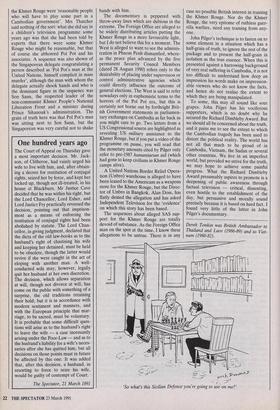One hundred years ago
The Court of Appeal on Thursday gave a most important decision. Mr. Jack- son, of Clitheroe, had vainly urged his wife to live with him, and, after obtain- ing a decree for restitution of conjugal rights, seized her by force, and kept her locked up, though not ill-treated, in his house at Blackburn. Mr Justice Cave decided that he was within his right, but the Lord Chancellor, Lord Esher, and Lord Justice Fry practically reversed the decision, pointing out that imprison- ment as a means of enforcing the restitution of conjugal rights had been abolished by statute. The Lord Chan- cellor, in giving judgment, declared that the dicta of the old law-books as to the husband's right of chastising his wife and keeping her detained, must be held to be obsolete, though the latter would revive if she were caught in the act of eloping with another man. A well- conducted wife may, however, legally quit her husband at her own discretion. The decision, which allows separation at will, though not divorce at will, has come on the public with something of a surprise, the old traditions retaining their hold; but it is in accordance with modern sentiment and manners, and with the European principle that mar- riage, to be sacred, must be voluntary. It is probable that some difficult ques- tions will arise as to the husband's right to leave the wife — a case incessantly arising under the Poor-Law — and as to the husband's liability for a wife's neces- saries after she has quitted him; but all decisions on those points must in future be affected by this one. It was added that, after this decision, a husband, in resorting to force to seize his wife, would be guilty of contempt of Court.
The Spectator, 21 March 1891


























































 Previous page
Previous page